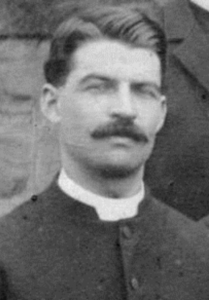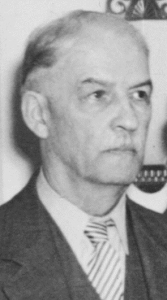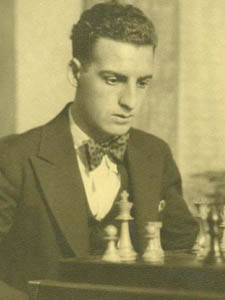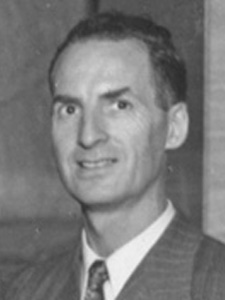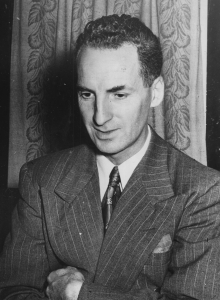Blake, Charles (June 12, 1880 - May 18, 1961)
Born in London, England in 1880 but emmigrated to Winnipeg in 1903, Blake read law before being called to the Manitoba Bar in 1909; two years later he moved to Brandon and set up his own practice. He served in France during the First World War, rising to the rank of major by its end. Blake returned to Brandon after the war but left the province for Ontario in 1925; he was subsequently called to the Ontario Bar in 1929 and the British Columbia Bar in 1949. He was still active as a lawyer when he passed away in White Rock, B.C. at the age of eighty.
Blake learnt chess in 1897 and was already a strong player when he arrived in Winnipeg. He was the only local player who could compete with fellow Winnipegger and Canadian champion Magnus Smith on something resembling even terms, although Smith generally finished ahead of Blake in competitions. After Smith moved to New York in 1907 Blake stepped into his shoes as the premier player in the area; apart from winning the Northwest championship five times in succession, Blake was twice runner-up in the Canadian championship (1909 and 1913) and in 1911 won the Western Chess Association championship (the precursor to the U.S. Open). Moving to Brandon curtailed Blake’s chess activities as did the Great War, although he provided a brilliancy prize for the 1918 Northwest tournament whilst on leave. He did make the journey from Brandon to Winnipeg to play in the Northwest competitions 1923-25 and won two of those championships before moving to Ontario.
Blake played in several more Canadian championships in the 1920s, generally finishing in the middle of the field. His last such event was in Hamilton in 1931, when he was apparently living in Windsor. After moving to this province he played in the BC - WA matches of 1949, 1950, and 1951, despite being around seventy years old at the time. His obituary in the White Rock Sun makes no mention of his military career or chess accomplishments. There are certainly soldiers who would prefer to forget their wartime service, but more likely by the time of Blake's passing there was no one left in the area who knew his early background: his wife had predeceased him by several years, and they left no offspring.
[Sources: Death registration; attestation papers, LAC; Canadian Chess Chat, November 1953, 23; White Rock Sun, May 25, 1961, front page]
Burrell, Herbert Heckford (July 28, 1870 - March 23, 1956)
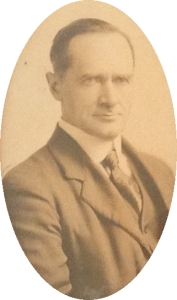 Born in Cawnpore, India (his father was a missionary). At age twenty-one Burrell completed a Bachelor of Music degree at Cambridge, remaining there as a tutor for two more years. In May 1898 he emigrated to Winnipeg, where he was employed by the municipal tax department. Apart from music (composing and playing the piano) Burrell was also an artist of some ability; he was a member of sketch clubs in both London and Winnipeg and had work published in Punch. Burrell volunteered for the army in July of 1916 and served until 1919; he was asked to be a war artist but refused, preferring to contribute in the more practical role of stretcher bearer (he sketched at the front lines anyway). In 1935 Burrell retired and moved to North Vancouver to provide a better climate for his son Arnold, who was asthmatic. Arnold took his initial piano and art lessons from his father and subsequently developed into a notable artist in his own right. The senior Burrell passed away in North Vancouver at the age of eighty-five and is interred in the military section of the North Vancouver Cemetery.
Born in Cawnpore, India (his father was a missionary). At age twenty-one Burrell completed a Bachelor of Music degree at Cambridge, remaining there as a tutor for two more years. In May 1898 he emigrated to Winnipeg, where he was employed by the municipal tax department. Apart from music (composing and playing the piano) Burrell was also an artist of some ability; he was a member of sketch clubs in both London and Winnipeg and had work published in Punch. Burrell volunteered for the army in July of 1916 and served until 1919; he was asked to be a war artist but refused, preferring to contribute in the more practical role of stretcher bearer (he sketched at the front lines anyway). In 1935 Burrell retired and moved to North Vancouver to provide a better climate for his son Arnold, who was asthmatic. Arnold took his initial piano and art lessons from his father and subsequently developed into a notable artist in his own right. The senior Burrell passed away in North Vancouver at the age of eighty-five and is interred in the military section of the North Vancouver Cemetery.
Burrell was taught chess at age eleven by his father. After emmigration he joined the Winnipeg chess club, and seems to have been an active club player for the rest of his life. He came second in the Northwest Championships of 1901 and 1903 but did not win the event until 1916, subsequently repeating as champion in 1927. In later life he said he received his best training from Magnus Smith, a frequent opponent unitl the latter left for New York in 1907. Burrell played Géza Maróczy and Emanuel Lasker when they visited Winnipeg, and while on leave during the war he had the chance to cross swords with Blackburne. Burrell participated in the 1904 Canadian championship in Winnipeg, scoring 5.0/11; his other championship appearance was in 1941, where he finished last - however, it should be remembered that Burrell was seventy-one years old. He was representing B.C. by that time, so must have done well in the B.C. championship for that year, although we have no information about the tournament except the winner (Leo Duval). Burrell was thus the second player from B.C. to take part in the Dominion championship, after John Ewing in 1924.
In the 1940s Burrell was a member and sometime treasurer of the Vancouver chess club and would walk from his home to the club and back via the Lions Gate bridge, there being no club in North Vancouver at the time. This changed in 1952 with the formation of the North Vancouver chess club, and despite his advanced age Burrell won the club championship in 1952, 1953, and 1955, only relinquishing it temporarily to Byron Arden in 1954. Burrell was also active in the BC - WA matches, and still played as high as board 15 (out of 30) in his last match in 1955. Around this time he said, "I have wasted many hours playing chess. She is a fascinating mistress. Keep her in check!" This may have upset the jealous Caissa, or perhaps it's just the vagaries of history, but for whatever reason we unfortunately have no published wins by Burrell - only losses and two draws.
Given his background and the fact that this Bulletin will appear around Remembrance Day, it should be noted that Burrell's war diaries were donated to the Canadian War Museum and excerpts may be read online. "After the war they say the question will be asked what did you do in the Great War? To us out here the question rather arises what have you done with your LIFE, any moment it may have gone from you."
[Sources: Death registration; attestation papers, LAC; diary excerpts at the Canadian War Museum website; Ellen Mackay; website devoted to the art of Arnold Burrell; Canadian Chess Chat: November 1953, 23; August/September 1955, front cover; March 1956, 17; Manitoba Free Press: March 3, 1906, 10; Vancouver Province: June 20, 1953, 11; June 25, 1955, 43; July 2, 1955, 39; March 26, 1956, 2; March 31, 27]
Creemer, David ("Dave") (October 5, 1902 - December 21, 1953)
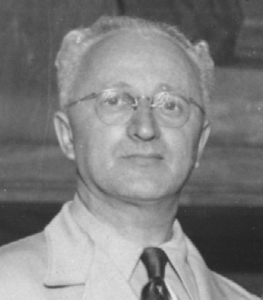 Born in Bessarabia, Russia (now largely Moldova). Trained as a tailor, Creemer emigrated
to Canada in 1920 and first lived in Toronto, working for Tip Top Tailors, etc. He married in
1927; shortly thereafter the couple moved to Winnipeg, where Creemer started his own tailoring
business. In October 1941 the family moved to Vancouver, where Creemer's brother and sister
already lived. He started the Fashion Garment Co., a made-to-measure ladies tailoring
establishment whose clientele included visiting celebrities such as Martha Rae and Ella
Fitzgerald. Tailoring seems to have been the family trade: Dave's brother Max was also in the
profession, as president of the Reliable Garment Co. Dave Creemer died at age fifty-one of
complications from an ulcerated stomach.
Born in Bessarabia, Russia (now largely Moldova). Trained as a tailor, Creemer emigrated
to Canada in 1920 and first lived in Toronto, working for Tip Top Tailors, etc. He married in
1927; shortly thereafter the couple moved to Winnipeg, where Creemer started his own tailoring
business. In October 1941 the family moved to Vancouver, where Creemer's brother and sister
already lived. He started the Fashion Garment Co., a made-to-measure ladies tailoring
establishment whose clientele included visiting celebrities such as Martha Rae and Ella
Fitzgerald. Tailoring seems to have been the family trade: Dave's brother Max was also in the
profession, as president of the Reliable Garment Co. Dave Creemer died at age fifty-one of
complications from an ulcerated stomach.
Creemer learnt to place chess in Russia. While in Toronto he was secretary of the Judean Chess Club, and played against Emanuel Lasker in an exhibition in 1926. In 1930 he defeated Sir George Thomas in Winnipeg, also during a simultaneous. He won the Manitoba championship in 1934, the Winnipeg title in 1937, and was one of Abe Yanofsky's first coaches. After moving to Vancouver, Creemer won the Vancouver Chess Club championship in 1942 and was instrumental in the founding of the Vancouver Jewish Chess Club in 1945. He was Vancouver champion 1946-48, but his greatest achievement as a player was winning the Open tournament held to celebrate the Vancouver Diamond Jubilee in July 1946.
Although Creemer was a strong player, his lasting legacy lies in the realm of chess organization and promotion. He held various positions on the BCCF Executive, including president, secretary, and publicity manager, and was chairman of the organizing committee which brought the Canadian Championship to the West Coast for the first time in 1951. John G. Prentice paid tribute to Creemer for his "tremendous amount of extra work, corresponding with leading players, making arrangements for visits from master players and staging tournaments and exhibitions." From the summer of 1947 until his death Dave Creemer wrote a weekly chess column in the Vancouver Province newspaper: each Saturday the column included a chess problem ladder, news from local, Canadian, and international events, and usually several games. This did much to publicize the BCCF and chess in general throughout the province.
The current trophy for the B.C. Junior Championship is the Dave Creemer Trophy. After his death a Dave Creemer Memorial Fund was established "for the purpose of introducing and encouraging chess in the schools of Vancouver and throughout B.C., also in high schools and among other youth groups or organizations" (BCCF Special Meeting, 13 January 1954). Monies from the fund were used to supply chess sets to schools and trophies for school competitions; in 1967 a BCCF motion was passed which stated "that the Trustees of the Dave Creemer Fund be instructed to wind up the Fund and to make the money left in the fund available to the Junior Chess Co-ordinator, and that the Junior Chess Co-ordinator ensure that the name of Dave Creemer is suitably perpetuated in the field of Junior Chess." This was done by holding the 2003 Junior Championship and naming the current trophy in his memory, on the fiftieth anniversary of his passing.
[Sources: Death registration; Al Creemer; Jewish Historical Society; Jewish Western Bulletin: July 19, 1946, 1; January 8, 1954, 2; Leonoff, Cyril E. Pioneers, Pedlars, and Prayer Shawls. Victoria: Sono Nis Press, 1978; Vancouver Province: September 24, 1949, 8; December 24, 1953, 11]
Davie, Cyril Francis, K.C. (January 30, 1882 - February 18, 1950)
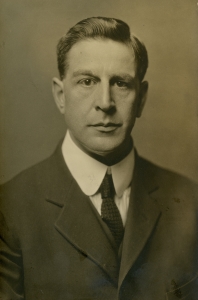
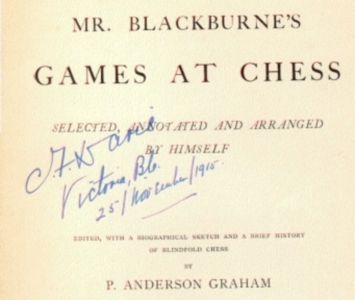 Davie's signature on the title page of his copy
of Mr. Blackburne's Games of Chess, subsequently owned by Nathan Divinsky
Davie's signature on the title page of his copy
of Mr. Blackburne's Games of Chess, subsequently owned by Nathan Divinsky
Born in Victoria, into one of the province's most important political families: his father, Alexander E.B. Davie, was B.C. premier 1887-1889, while his uncle Theodore held the same office during the years 1892-1895. Davie studied law at Ottawa University and was called to the bar in B.C. in 1907. In 1924 he entered politics, serving as the Conservative MLA for Cowichan-Newcastle until 1933; for the last three years of this term he was also Speaker of the House. From 1929 to 1931 Davie chaired a royal commission on health insurance and maternity benefits, and became a strong advocate for state health insurance. After 1933 he retired to private law practice in Duncan. Davie was the author of Common Law and Statutory Amendment in Relation to Contributory Negligence in Canada, as well as a prolific contributor to the Canadian Bar Review.
This literary bent was also evident in Davie's chess activities: he wrote a chess column in the Victoria Daily Colonist from 1916 until his political career forced him to hand over the reins to Thomas Piper, and was also a contributor to the British Chess Magazine. It is not known when he learnt to play chess, but in 1914 Davie took a course of instruction from Thomas Piper. It appears he was a good student, for two years later he won the inaugural Victoria City Championship by beating William J. Barker in a match (apparently this also marked the first time chess clocks were used for a match in Victoria).
However, it was in the field of correspondence chess that Davie made his most important contributions. In April 1916 he formed the Canadian Branch of the Chess Amateur Correspondence League, which ran various tournaments for both American and Canadian players. Davie's connection with the league did not last long: he allowed the CACL (Canadian Branch) to be part of the merger which led to the formation of the Correspondence Chess League of America in 1917. He withdrew from any role in the new organization, on the grounds that since there were so few players in Western Canada, control would be better exercised from further east. Despite this short tenure, he inaugurated the first Canadian correspondence championship (won by R.W. Worsley of Yorkton, Saskatchewan), as recognized and continued now by the Canadian Correspondence Chess Association.
[Sources: Death registration; British Chess Magazine, August 1915, 280; Avery, Bryce D. Correspondence Chess In America. Jefferson, N.C.: McFarland, 2000; Vancouver Province, February 20, 1950; Vancouver Sun, February 20, 1950; Victoria Daily Colonist: March 12, 1916, 14; March 26, 1916, 24; April 2, 1916, 9]
de Havilland, Walter Augustus (August 31, 1872 - May 20, 1968)
Born in Lewisham, Kent (England), into a distinguished family which traces its roots back to the time of the Norman conquest; the aircraft designer Sir Geoffrey de Havilland was a relative. Brought up on the Channel Island of Guernsey, de Havilland attended Harrow before reading theology at Cambridge University; he won his Blue as a participant in the annual Oxford-Cambridge rowing match. After graduation de Havilland moved to Japan; he learnt Japanese and Chinese and became an expert on oriental patent law, writing several books on the subject.
De Havilland married Lilian Ruse in 1914 and the couple settled in Tokyo; they had two daughters, Olivia (b. July 1, 1916) and Joan (b. October 22, 1917). The marriage failed: Lilian discovered that her husband was having an affair with the household maid, Yoki. She and her two daughters left de Havilland for California in 1919, but the couple was not officially divorced until 1925; de Havilland subsequently married Yoki in 1927. Olivia and Joan did not even see their father again until 1933; at that point it was decided that Joan should finish her schooling in Japan, but she left in 1934 after her father behaved improperly towards her. The sisters remained estranged from their father from then on; after they became famous film stars de Havilland tried to contact them (seeking unneccessary support), but they always refused to see him.
De Havilland and Yoki fled Japan just before World War 2 and went to the U.S.; since Yoki was Japanese she had to be interned during the war, but de Havilland arranged accommodations for them at the Broadmoor resort in Colorado Springs. Following the end of the conflict the couple moved to Victoria, where Yoki died in 1958. In 1960 de Havilland married for the third time, to Rosemary (Mary) Beaton of Victoria; eight years later the couple was residing in North Vancouver when de Havilland passed away at the age of ninety-five.
It is not know when de Havilland learned to play chess, but considering the limited number of opportunities to play in Japan, it seems likely that he was familiar with the game at least as early as his studies at Cambridge. Apart from learning oriental languages de Havilland also adopted some asian pastimes, including go: Joan Fontaine reported that when she was living with her father in Tokyo, he spent much of his time at his chess and go clubs. He was proficient enough to author The ABC of Go, published in 1910. It is not known whether he learned Japanese chess or shogi, although he certainly knew some shogi players (see below).
The first specific references to de Havilland and chess come from 1933. In January World Champion Alexander Alekhine visited Tokyo and gave a 14-board blindfold simultaneous at the Imperial Hotel, which was where de Havilland happened to be living. One of Alekhine's opponents was the shogi champion Yoshio Kimura; Alekhine thought highly enough of their game to later include it in one of his volumes of best games. However, this was not their only meeting; a few days before the simultaneous the same opponents played an offhand game, which Alekhine apparently won with ease (Kimura knew the moves of occidental chess, but had had hardly any practice). The umpire on this occasion was listed as being "assisted by Mr. de Havilland, the well-known British resident of Tokyo." [Japan Times & Mail, January 20, 1933, pp. 1-2] The newspaper noted there were two umpires for the simultaneous proper, "one a foreigner and one Japanese," but did not name them: perhaps the foreigner was de Havilland. There are two photographs of the event in the Japan Times of January 22, 1933; one of them shows the umpires(?) standing next to a seated Alekhine, but the microfilmed images are not clear enough to attempt positive identifications.
After moving to Victoria chess seems to have become one of de Havilland's major pastimes, as go was during his years in Japan. He played on board 17 (out of 49) in the 1948 B.C. - Washington international team match, and was a participant in the 1950 B.C. Championship in Victoria, scoring a respectable 3/7 - this at the age of seventy-seven! During the 1950s he regularly took part in the Victoria and District Championship, generally finishing around the 50% mark, and in 1957 he sponsored a Swiss event at the Victoria chess club.
Postcript: despite having to watch her father play go and chess, it is not known whether Joan Fontaine ever took an interest in either game. However, Olivia de Havilland was a chess player, although it seems highly unlikely she learnt the game from her father (she was largely estranged from him from the age of two onwards). A photograph in Edward Winter's Kings, Commoners and Knaves shows her contesting a game with Errol Flynn. There is also a memorable scene in The Private Lives of Elizabeth and Essex (1939) in which Olivia (as Lady Penelope Gray) plays a game with Queen Elizabeth (Bette Davies); Penelope manages to capture the Queen's knight (symbolic of Essex/Errol Flynn), but this action is met by Elizabeth imperiously sweeping the pieces off the board.
Divinsky, Nathan Joseph Harry (October 29, 1925 - June 17, 2012)
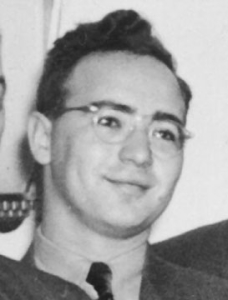
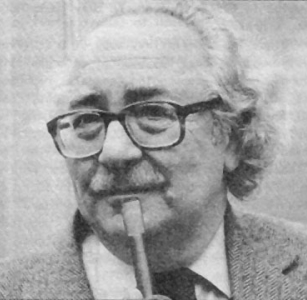
Born in Winnipeg to Yiddish-speaking immigrant parents from Poland and Ukraine. Educated at St. John's High School, Divinsky earned degrees from the University of Manitoba and University of Chicago, graduating with a Ph.D. from the latter at age twenty-four in 1950. After a year at Ripon College, Wisconsin he returned to the University of Manitoba as an Assistant Professor of Mathematics. In 1959 he moved to Vancouver to take up a similiar post at the University of British Columbia, retiring as Professor Emeritus in 1991. Divinsky was active in local politics in Vancouver, serving as a member of the school board and as an alderman. During the years 1972-1983 he was married to future Prime Minister Kim Campbell. Divinsky was part owner of the Granville Island restaurant Bridges and wrote a guide to good food in the Vancouver area ("an intellectual gastronomic piece of gossipy good fellowship"). Possessor of a resonant baritone voice, Divinsky was also an amateur pianist of note and was particularly fond of the Gilbert and Sullivan operettas. Apart from chess Divinsky’s other ‘hobby’ was bridge, at which he also excelled. He became a life master in 1972 and was the Canadian Bridge League's contract bridge champion in 1987.
Divinsky's chess accomplishments were also wide ranging and multi-faceted. He was taught the game at age six by his father; after initial setbacks at school he improved his play by reading Tarrasch's The Game of Chess. In 1940-42 he helped organize the St. John's High School Chess Club and was its champion; subsequently Divinsky played on several University of Chicago teams and founded a club at Ripon College. Provincially he came second in the Manitoba Championship in 1945 and won the event in 1946 and 1952. In three appearances in the Canadian Championship his best showings were joint third at Saskatoon 1945 (behind Yanofsky and Yerhoff) and clear fifth at Vancouver 1951. Divinsky served as second reserve on two Canadian olympiad teams; at Amsterdam 1954 he only played one game (a draw), but in Havana in 1966 he scored plus one in eight games. His only other international event appears to be Bognor Regis 1966, the Churchill Memorial tournament, where he finished tied for seventh in the seventy-four player field behind Karaklaic and Matanovic, but ahead of Golombek and Wade. Divinsky's other over-the-board play was restricted to local team matches and simultaneous displays, both giving and on the receiving end (Reshevsky, Bisguier, Kasparov). He was active as a player as late as 2004, when he participated with Doug Freeman in a fundraising pairs event for the 2005 Macskasy Memorial. Divinsky was also part of the UBC team which defeated a team from the University of Moscow 1.5-0.5 in a correspondence match 1964-68.
In the realm of chess administration Divinsky served two terms as president of the CFC (1953, 1993) and was FIDE representative 1987-1992 and 2004-2007; he also represented Canada in official capacities many times, most recently as captain of the women's team at the Calvia Olympiad in 2004. Divinsky achieved considerable popularity as a media figure in 1986 when he commented on the London leg of the Kasparov-Karpov world championship for BBC television. Divinsky's other major area of involvement in chess was in writing. He began contributing game annotations and other reports to Canadian Chess Chat in the 1950s, and subsequently served as its editor from 1959 until the early 1970s. Divinsky wrote two relatively short-lived chess columns, both called Chess Charivari, one for the Winnipeg Tribune 1953-1964 and the second almost exactly ten years later for the Vancouver Province, 1963-64. Divinsky also authored four books on chess: Around the Chess World in 80 Years in two volumes (1961 and 1965), Warriors of the Mind (with Raymond Keene, 1989), The Batsford Encyclopedia of Chess (1990), and Life Maps of the Great Chess Masters (1994). During the last decade of his life Divinsky's main research interest was the nineteenth-century German player, author, historian and diplomat von der Lasa; it was said that a book was forthcoming in collaboration with Peter Stockhausen, but presumably this project will now remain incomplete.
Enke, Max (March 12, 1884 - January 29, 1971)
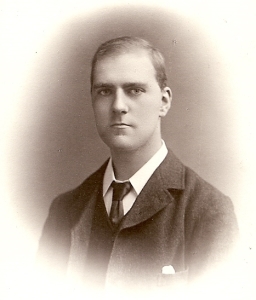
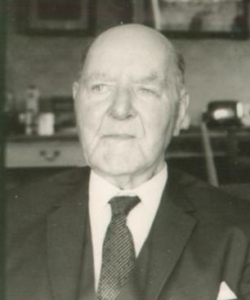
Born in Manchester, England, of German parents who had become naturalized citizens. The family moved to Belgium in the 1890s where they ran a factory which treated rabbit skins for the felt hat trade. In 1907 Max emigrated to Canada and bought a farm on Galiano Island, where he reared pedigree Jersey cattle, sheep, and pigs; he also held other business interests in Victoria. In 1928 he returned to Belgium to manage the family factory; when Hitler invaded in 1940 Enke was unable to escape in time and was interned in various civilian prisoner of war camps. At Tost one of Enke's fellow internees was P.G. Wodehouse, who used Enke as the basis for the character of Lord Uffenham in Money in the Bank, written at Tost (Lord Uffenham also appears in the later Wodehouse novel Something Fishy). Enke is also mentioned frequently in Wodehouse's correspondence from the time; being German speaking, he acted as interpreter between the camp authorities and the other prisoners. After the war Enke returned to live out his retirement in Victoria.
In the words of his daughter, Ruth: "Max was very large, over six feet, 270 lbs when first interned but lost 70 lbs in the first two months. He was also very deaf, very bald, had a beautiful brain, very interested in chess, mathematics and scientific matters. He was never bored as he could always amuse himself working out maths or chess problems. He emigrated to Canada in 1907, bought a farm on Galiano Island and eventually gave a tract of land to the people of the island to be held in trust and perpetuity as a park . . . He was an eccentric but true, honest and utterly dependable." [N.T.P. Murphy, In Search of Blandings (London: Seck and Warburg, 1986): 120.]
We have an unusually fine perspective on Enke's activities as a chess player through the large number of game scores he donated to the BC Archives. The earliest date from various Victoria chess club events in 1923. In early 1925 we find a series of games played at queen-knight odds, the giver being Thomas Piper. This seems to have been Piper's preferred method of instruction(?), since there are also reports of him playing games at rook odds with Victoria city champion Partington. In any case, the games seem to have had their desired effect, because at Easter of 1925 Enke won the BC championship; he subsequently repeated the feat in 1927, when the "championship" was a match with frequent title-holder William Barker.
Enke was active as a club player in Belgium in the 1930s, and had simultaneous wins against Grob and Soultanbeieff to his credit. He played many games during his internment and was the Tost chess champion (it is unclear whether he ever played Wodehouse, it appears the latter did not play). In retirement he played well enough to score 9.5/16 in the 1952-53 Victoria city championship, this when almost seventy; other participants that year included Olavi Sarakannas (the winner), Lionel Basanta (grandfather of Gary), and Walter de Havilland.
Ewing, John Morton (June 24, 1889 - February 28, 1952)
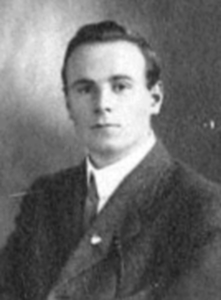
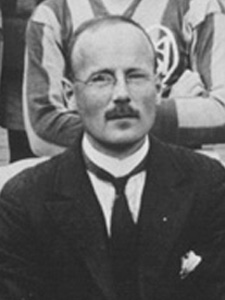
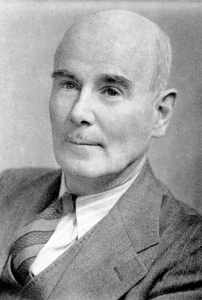
Born in Nazareth, Palestine (his father was a missionary), of Scottish ancestory. Received his initial education at Edinburgh University. Emigrated to Canada in 1910. Graduated from Queen's University (B.A. 1926) and University of Toronto (B.Paed. 1928, D.Paed. 1931). Employed as a public school teacher in B.C. (1911-1929), instructor in educational psychology at Vancouver Normal School (1929-1944), and principal and professor of philosophy and psychology at Victoria College (now University of Victoria) (1944-1952). Author of Reflections of a Dominie (1931) and Understanding Yourself and Your Society (1947), coauthor with D.L. McLaurin of Social and Educational Psychology (1937); also wrote many essays and poems.
Ewing was taught chess at an early age, and "was the youngest entrant in the Richardson cup competition playing for Edinburgh. Played in the Edinburgh team for three years without losing a game." He won the B.C. Championship in 1916 and 1919-1923; on entering the 1923 competition Ewing made an announcement "that he would do so for the last time, desiring to make his chess activities for the future a source of real pleasurable pastime rather than a serious and arduous task." In recognition of his sequence of wins the B.C. Championship trophy, the Bowser Shield, was given to Ewing permanently; he responded by donating a new trophy, the Ewing Cup, for the competition. During this time Ewing was also active in team events, playing for North Vancouver, and also played first board for Vancouver in the Vancouver - Winnipeg telegraph match of 1924. In August 1924 Ewing was a participant in the Dominion (Canadian) championship in Hamilton, ON, where he finished with a respectable 8/15. He seems to have retired from competitive play thereafter, but reappeared in the mid-1930s, winning the B.C. championship for a record seventh time in 1936. Ewing also produced and edited a chess magazine (the British Columbia Chess Magazine, subsequently the Canadian Chess Magazine) during the years 1918-1920, but like so many early magazines there simply was not a large enough subscription base for it to survive.
[Sources: Death registration; Canadian Who's Who, 1948; British Chess Magazine: 1916, 277; 1925, 354; Toronto Evening Telegram, August 30, 1924, 23; Vancouver Sun, April 16, 1916, 6; Victoria Daily Colonist: April 4, 1923, 10; April 22, 1924, 10; February 29, 1952, 1]
Gonnason, Aaron (November 25, 1865 - December 27, 1938)
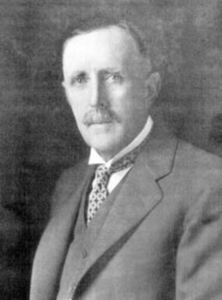
Born in Sweden. Gonnason's family emigrated to America when he was six, where they mined coal and farmed in Kansas. In 1883 Aaron and his elder brother Benjamin departed for the more lucrative possibilities of the Pacific Northwest lumber industry; after a year in Seattle they settled in Victoria, where they found employment in a mill. In 1890 they joined with Joseph J. Lemon to start their own millwrighting firm, Capital Planing Mills (later Lemon, Gonnason and Co. Ltd.); Aaron rose to become president of the company, a position he held for many years. The company eventually ceased operations in 1958, Aaron and Benjamin having died within five days of each other twenty years earlier.
Gonnason was a competent club player, but was more important as a benefactor: he donated two trophies that bore his name. The first, given in 1921, was a cup for the Victoria city championship, a trophy which Gonnason himself won in 1922 with a score of 8/10. The second Gonnason Cup was donated for a provincial intercity team championship; beginning in the early 1920's, the trophy was awarded to the winners of a team match between two cities and was retained for one year, at which point another city could challenge the trophy holders to a match. The last recorded such instance was in May 1962, when the Vancouver City C.C. retained the Gonnason Cup by defeating both the Vancouver Continental C.C. and the Prince George C.C. in match play.
[Sources: Death registration; Victoria Daily Colonist: February 6, 1924, 10; December 28, 1938, 6; Victoria Times-Colonist, January 24, 1993, M3; B.C.C.F. minutes, February 5, 1960]
Helman, Abraham M. ("Abe") (December 10, 1907 - March 16, 1952)
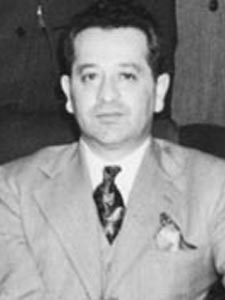
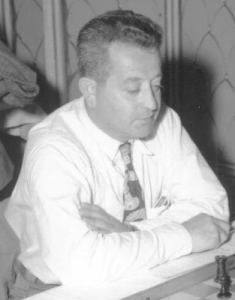
Born in Russia, Helman came to Winnipeg around 1926; he was involved in the retail business, as he owned a store on Main Street. Helman moved to Vancouver in the autumn of 1945 and became the proprietor of Tip Top Furniture; he died of heart failure at the relatively young age of forty-four.
It is not known when Helman learnt to play chess, but he became involved in the local chess scene soon after emigrating to Winnipeg. He was a member of the Winnipeg Jewish Chess Club, at that time the strongest club in Western Canada, and played in the Winnipeg team championships for the club. Helman won the Manitoba championship in 1933 and 1944; he participated in three Canadian championships (1931, 1933, and 1945), his best result being clear second place in 1933, just a half-point behind winner Robert Martin. In 1939 Helman was a member of the Canadian team at the Buenos Aires chess olympiad.
After moving to Vancouver in 1945 Helman was quick to join with former Winnipegers Dave Creemer and Frank Atnikov in founding the Vancouver Jewish Chess Club. Helman was the first president, played board one for the club in the interclub league, and won the club championship in three consecutive years, thus becoming the permanent holder of the Rothstein trophy. He was B.C. champion in 1947 and 1948, and was also B.C. speed chess champion in the latter year.
Helman appears to have been less active chess wise in the last few years of his life. Perhaps the arrival of Miervaldis Jursevskis in 1949 discouraged competition to some degree, or business concerns became too pressing; it is know that Helman did not play in the 1951 Canadian championship in Vancouver because of illness. Apart from his winning of the speed title in 1948 there is no particular mention of Helman's prowess at speed chess, but judging by the form of two memorials one assumes this must have been the case. After his untimely death in 1952 the Vancouver Jewish CC held a Helman Memorial Speed Tournament (won by Jack Taylor and Charlie Millar), and his friends back in Winnipeg donated the Abe Helman Memorial Trophy, to be held by the winner of the Canadian speed chess championship. This competition was first held during the 1953 Canadian championship in Winnipeg, and was fittingly won by another Abe from Winnipeg - Abe Yanofsky.
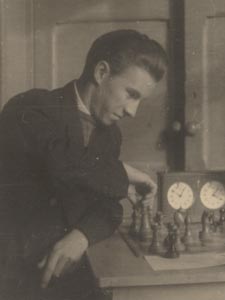
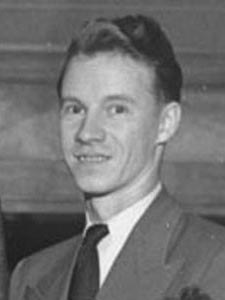
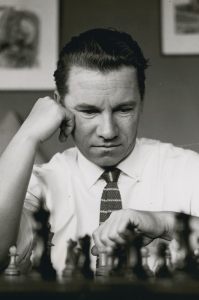

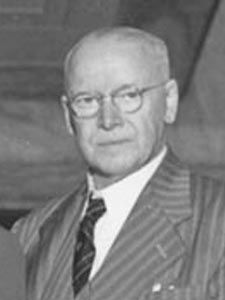 Born in Bowmanville, Ontario, of Scottish ancestory. He lived in the Toronto area until 1908, then moved to Regina
before finally settling in Vancouver in 1912. Trained in the world of finance (in 1905 he was a teller at the Canadian
Bank of Commerce in Hamilton, Ontario), Millar was president of Seaport Agencies (which he also founded) and the British
Empire Dock Co. Ltd. He learnt to play chess at the age of twelve, and was a member of both the Toronto Chess Club and
Hamilton Bridge and Chess Club. Champion of Regina while he lived there, Millar joined the Vancouver Chess Club soon after
moving here. He remained a stalwart member until 1946, when his allegiance went to the newly-founded City Chess Club. Millar
won the B.C. Championship four times, 1931-33 and 1937; for the first sequence of three wins he was presented with the
Ewing Cup in perpetuity. He also won the Vancouver Championship on a number of occasions, along with various club championships
and tournaments. Contemporary reports and those who remember him comment particularly on Millar's rapidity of play. 1951
Champion Maurice Pratt noted that the way to beat Millar was to seemingly concentrate on one side of the board while furtively
planning a tactic on the other; a sudden move on this other side would hopefully be met with an equally quick and perhaps
superficial response which could then be taken advantage of. Pratt also mentioned that Millar was often tense, a possible
contribution to his death. Also noteworthy was Millar's longevity: he played in the first B.C. Championship in 1916 (at the
age of thirty-four!) and also played in the championship in the year of his death, some thirty-eight years later. This record
has only been matched and surpassed recently, by Jonathan Berry (1969-2007), Dan Scoones, and Gerry Neufahrt (1956-2001).
Born in Bowmanville, Ontario, of Scottish ancestory. He lived in the Toronto area until 1908, then moved to Regina
before finally settling in Vancouver in 1912. Trained in the world of finance (in 1905 he was a teller at the Canadian
Bank of Commerce in Hamilton, Ontario), Millar was president of Seaport Agencies (which he also founded) and the British
Empire Dock Co. Ltd. He learnt to play chess at the age of twelve, and was a member of both the Toronto Chess Club and
Hamilton Bridge and Chess Club. Champion of Regina while he lived there, Millar joined the Vancouver Chess Club soon after
moving here. He remained a stalwart member until 1946, when his allegiance went to the newly-founded City Chess Club. Millar
won the B.C. Championship four times, 1931-33 and 1937; for the first sequence of three wins he was presented with the
Ewing Cup in perpetuity. He also won the Vancouver Championship on a number of occasions, along with various club championships
and tournaments. Contemporary reports and those who remember him comment particularly on Millar's rapidity of play. 1951
Champion Maurice Pratt noted that the way to beat Millar was to seemingly concentrate on one side of the board while furtively
planning a tactic on the other; a sudden move on this other side would hopefully be met with an equally quick and perhaps
superficial response which could then be taken advantage of. Pratt also mentioned that Millar was often tense, a possible
contribution to his death. Also noteworthy was Millar's longevity: he played in the first B.C. Championship in 1916 (at the
age of thirty-four!) and also played in the championship in the year of his death, some thirty-eight years later. This record
has only been matched and surpassed recently, by Jonathan Berry (1969-2007), Dan Scoones, and Gerry Neufahrt (1956-2001).
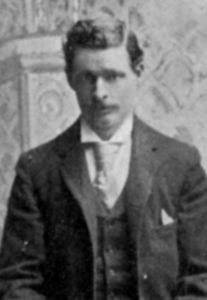 Born in Kennington, part of the Borough of Lambeth in London, England. His father and grandfather were both barge builders, and
Piper also learnt the family profession, although at one point he was apprenticed to become a
Born in Kennington, part of the Borough of Lambeth in London, England. His father and grandfather were both barge builders, and
Piper also learnt the family profession, although at one point he was apprenticed to become a 